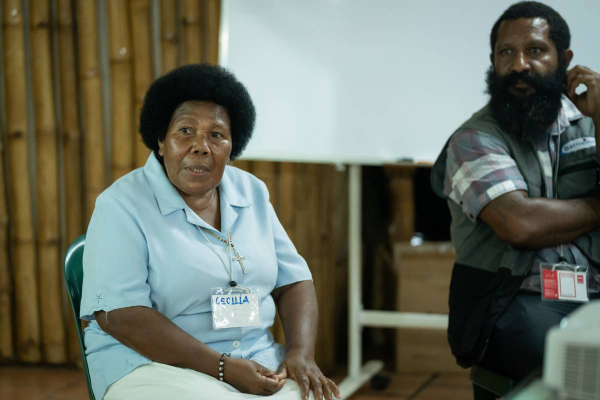Mind, Body and Soul: A Conversation About Mental Health

Karen DeGraaf is familiar with the internal battles Christian women commonly face. As a clinical counselor serving Wycliffe staff, Karen helps her clients navigate relational struggles, depression, anxiety and other mental health issues. But Karen’s interest in mental health isn’t just academic; it’s personal: “I have an anxiety disorder,” she said. “I’ve had to treat it for about 25 years.”
Karen began to recognize the importance of her own mental and emotional health when she was a young mom. “I had three small children and was nearly out of my mind with exhaustion and depression. A friend of mine said, ‘You know, if you’re not taking care of yourself and getting what you need, you’re not able to take care of those kids.’ And that just kind of flipped a switch in my brain,” she explained.
Stressors that can lead to anxiety and depression are prevalent in the American culture — especially in the church. “We’re juggling so many things, trying to do everything,” Karen noted. “I think we have such high expectations of ourselves that we get tired and discouraged.”
Christian women often carry the weight of ministry commitments in addition to trying to be good friends, wives and moms. That sometimes causes women to ignore their own needs: “When we do that,” Karen explained, “we’re really kicking the can down the road because it’s going to come back and bite us eventually.”
Caring For Ourselves and Each Other
If mental health issues are common, what prevents many Christian women from seeking the help they need? Karen believes that women are often afraid that seeking care will disrupt their lives, and they think they can handle their problems by themselves. “It’s hard to admit that we need other people and our lives do impact [them],” she said. “There’s a lack of understanding of how important it is to have someone see you, hear you, listen to you, understand you and show compassion toward you when you’re suffering emotionally and mentally.”
Professional counseling and medication can be necessary and beneficial, but they aren’t the only ways we can care for our mental health. In her struggle with anxiety, Karen has learned the importance of laughter and physical exercise, which both stimulate the brain. “Our nervous systems, our minds, our souls are … all intertwined. So if we’re not taking care of our physical body, we’re also not taking of our hearts and minds,” she stated. When it’s hard to find sustained time to exercise, Karen suggested being active for shorter periods throughout the day: “Just get up and move your body around a few times a day. Take a few 10-minute walks.”
Maintaining close, healthy relationships is also critical to our wellbeing — but it can be challenging in seasons of physical isolation. “We need to find friends who love us and will speak truth to us,” Karen explained. And while online interaction can be good, it can’t permanently replace face-to-face relationships. “At the end of the day, we’re actually more exhausted,” she said. “We get about 90% of our communication and feedback from other people through non-verbal language. You can pick up so many messages from someone you know just by how they’re holding themselves, how they’re looking at you, and we don’t have to use our brains consciously to figure that out. So when we’re online, we’re having to use our brains to do so much more work to figure out all the things we would usually get by being in the same room with someone.”
Karen continued: “Our brains are wired to be in relationship with other people. We’re constantly caring for each other’s neurobiology, helping wire and attune each other’s brains. When we have healthy relationships, being in physical proximity is really important.” If health concerns prevent close contact, Karen said that “even yelling at each other across 10 feet is better than not seeing anybody.”
But Karen also acknowledged that circumstances don’t always allow face-to-face connection, especially for singles who live alone. “People aren’t necessarily looking out for them,” she recognized. One of Karen's suggestions is to be intentional about offering connection by asking how you can help or what kind of interaction your single friend, coworker, family member or neighbor might need.
Scripture and Mental Health
Mental health has historically been a sensitive topic in the church because many Christians are taught that emotional struggles are simply symptoms of spiritual weakness and can be remedied only by reading Scripture and praying more. But Karen — who has dedicated her life to furthering the work of Bible translation — doesn’t see a conflict between believing Scripture and seeking professional mental health care.
She explained: “The Bible is the source of truth. It holds God’s plans for humanity and the truth about humanity. I totally believe that. But I also believe that we have learned things over time about how human beings work. Just neuroscience itself in the last 20 years has shown us so much about how God has created us, and it aligns perfectly with Scripture.”
Karen appreciates that Scripture doesn’t tiptoe around mental health issues either. She especially likes the narratives that show interactions between God and people in the midst of an emotional crash, such as the story of the prophet Elijah in 1 Kings 18 and 19. “Elijah had just had this huge victory on Mount Carmel with the priests of Baal,” Karen recalled. “He called fire from heaven. There’s proof to the people of Israel that God is God. ... And then he’s able to run ahead of Ahab’s chariot. It’s this incredible burst of adrenaline.”
However, immediately following this emotional high, Elijah learned that Queen Jezebel was calling for his death. Karen elaborated: “Elijah was afraid and fled for his life. He went to Beersheba, a town in Judah, and he left his servant there. Then he went on alone into the wilderness, traveling all day. He sat down under a solitary broom tree and prayed that he might die. ‘I have had enough, LORD,’ he said. ‘Take my life, for I am no better than my ancestors who have already died’” (1 Kings 19:3-4, NLT).
“[Elijah] is discouraged and feeling very alone,” Karen summarized. “[But] God doesn’t chastise him for this! He meets [Elijah’s physical and spiritual] needs. ... And God meets with him and lets him know that he is not alone.”
She concluded: “I think that’s a fantastic story and so encouraging — not just encouraging us to be okay with taking the rest and self-care we need, but knowing that God ministers to us the way we need him to.”
Karen also sees significance in Jesus’ reaction to Peter, James and John in the Garden of Gethsemane the night before his crucifixion. Although he asked the three disciples to wait with him and pray, they couldn’t stay awake. Jesus responded gently, knowing his friends were exhausted and grieving: “The spirit is willing, but the body is weak” (Matthew 26:41b, NLT).
“God understands how we’re made. He lived in [a physical] body. He understands physical exhaustion and pain that overwhelms,” Karen emphasized.
Holding Onto Hope
Over the years of dealing with anxiety, serving in a politically unstable region of Africa and providing counseling for others, Karen has discovered an important coping skill. “I’ve learned to accept the reality that life is uncertain. It always has been. I’ve kind of learned the hard way that I’m not in charge,” she laughed.
Karen anchors herself to Scripture passages that remind her of God’s character and love, like Psalm 103:2-8: “Let all that I am praise the LORD; may I never forget the good things he does for me. He forgives all my sins and heals all my diseases. He redeems me from death and crowns me with love and tender mercies. He fills my life with good things. My youth is renewed like the eagle’s! The LORD gives righteousness and justice to all who are treated unfairly. He revealed his character to Moses and his deeds to the people of Israel. The LORD is compassionate and merciful, slow to get angry and filled with unfailing love” (NLT).
God’s goodness and healing in the present greatly encourage Karen, but she also holds onto hope for the ultimate healing promised in Revelation 22:3: “No longer will there be a curse upon anything. For the throne of God and of the Lamb will be there, and his servants will worship him” (NLT).
And she holds onto the same hope for her clients in hard seasons. “That’s the truth that I like to focus on: ‘You are okay. ... I believe this experience is going to hurt a lot, but you will not be spiritually harmed through this.’ I would never want to minimize somebody’s pain, but that truth can change their perspective.”
Learn about how Scripture can help people heal from trauma in our free webinar.






